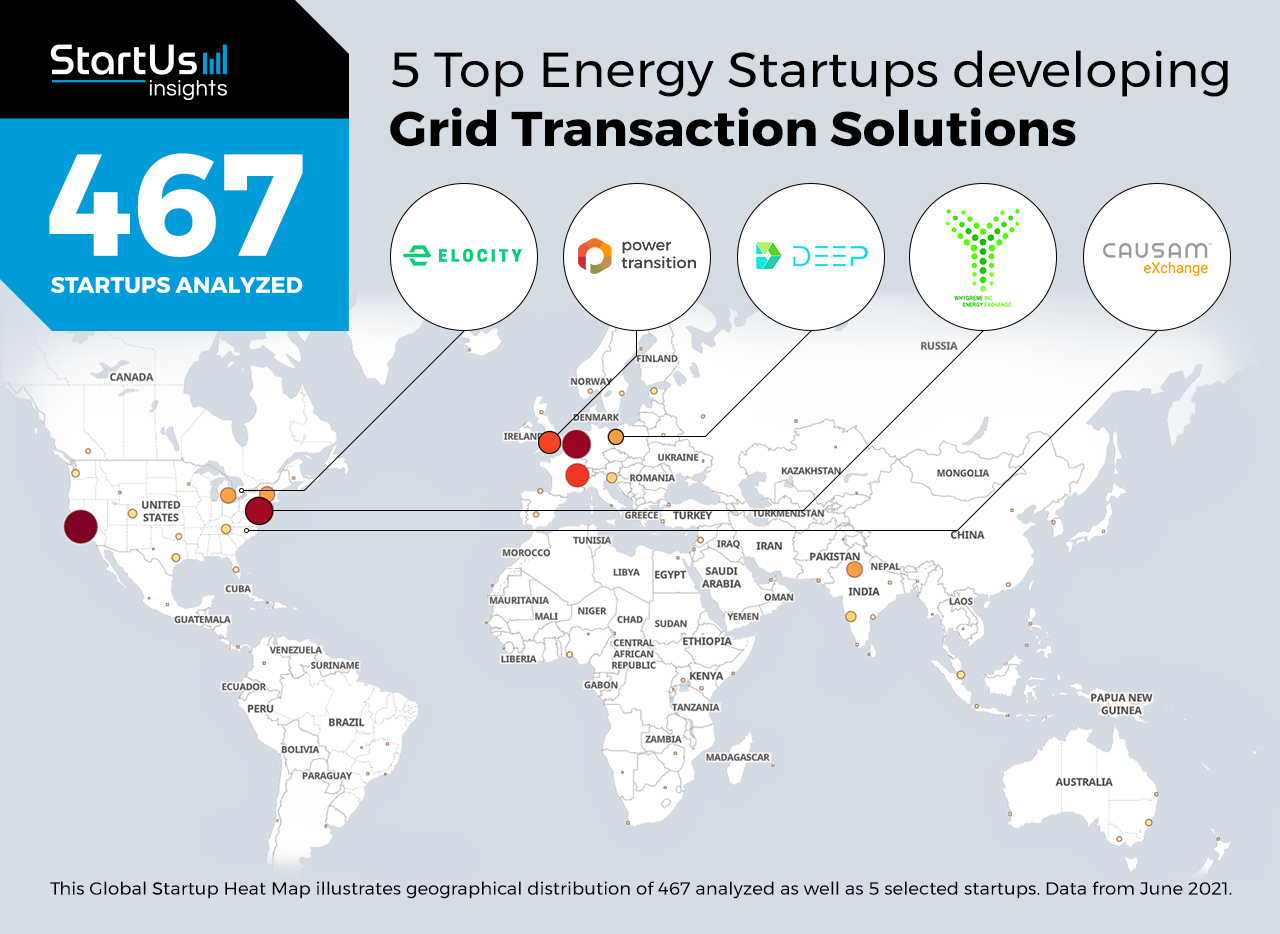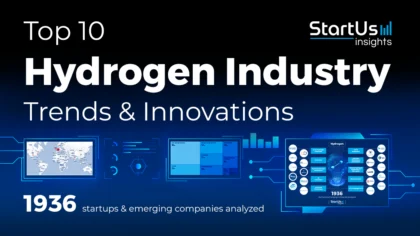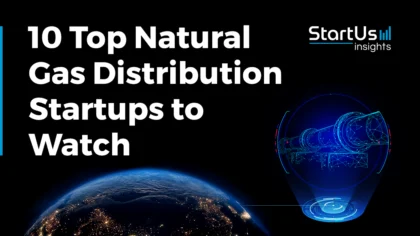Staying ahead of the technology curve means strengthening your competitive advantage. That is why we give you data-driven innovation insights into the energy industry. This time, you get to discover 5 hand-picked startups developing grid transaction solutions.
Global Startup Heat Map highlights 5 Top Grid Transaction Solutions out of 467
The insights of this data-driven analysis are derived from the Big Data & Artificial Intelligence-powered StartUs Insights Discovery Platform, covering 2.093.000+ startups & scaleups globally. The platform gives you an exhaustive overview of emerging technologies & relevant startups within a specific field in just a few clicks.
The Global Startup Heat Map below reveals the distribution of the 467 exemplary startups & scaleups we analyzed for this research. Further, it highlights 5 energy startups that we hand-picked based on criteria such as founding year, location, funding raised, and more. You get to explore the solutions of these 5 startups & scaleups in this report. For insights on the other 462 grid transaction solutions, get in touch.

DEEP offers a Decentralized Energy Exchange
Decentralized energy exchange gives consumers and producers a platform to directly exchange energy assets, without the interference of a governing body. This reduces transmission losses, providing local solutions to energy challenges. Startups develop technologies that facilitate direct energy exchange between different entities. For example, using blockchain technology for smart contracts decentralizes energy exchange, allowing for transparent and accountable peer-to-peer (P2P) transactions.
DEEP is a German startup that facilitates decentralized energy exchange among consumers and utility companies. Its technology, Decentralized Retailer (DR), is a virtual machine that acts as an autonomous agent. Using blockchain technology, DR conducts financial settlements between users in a trustless, P2P manner. DEEP also develops energy applications such as decentralized applications for grid balancing and electric vehicle charging, among others.
Causam eXchange streamlines Building Energy Management
Individual residents in apartment communities have little ability to optimize energy transactions. Owing to a lack of insight on energy patterns, homeowners use energy inefficiently leading to greater monetary and energy expenditure. Because of this, startups develop solutions tackling challenges associated with building energy management. For example, virtual transaction platforms provide analytics on energy expenditure to individual consumers.
Causam eXchange is a US-based startup which provides building energy management systems. Its solution EnergyNet is an online platform that integrates onsite energy generation and storage and streamlines transactions. It allows energy providers to lower transaction costs and streamline direct energy procurement to meet customer demand at a lower cost and delivers real-time digital contracts. It also generates tailored solutions that optimize energy assets based on live market conditions.
WHYGRENE facilitates Transactive Energy Management
Distributed energy resources (DER) present an uninterruptible power supply solution to consumers. For urban prosumers that generate renewable power, grid transactions offer a way to earn from their extra energy. To enable this, startups provide customers with transactive DER management systems (TDERMS) that facilitate demand response (DR). TDERMS also analyze energy consumption patterns and optimize consumer’s usage of power.
US-based startup WHYGRENE provides transactive energy solutions for DERs. It develops CryptoJoule, a blockchain-based distributed energy exchange. The startup’s app incentivizes customers to balance grid load by installing battery storage and participating in demand response programs. The secure energy exchange provides real-time encrypted DER data for virtual power plants (VPP), providing the grid with excess generated energy during off-peak hours.
Power Transition provides a Microgrid Transaction Platform
Microgrids are an increasingly popular alternative to conventional grids as a means of clean renewable energy. Especially for P2P energy transactions, microgrids deliver power directly to consumers and help decentralize energy consumption. To facilitate the adoption of microgrid transactions, startups engineer platforms where consumers easily interface with energy providers to purchase and sell power transparently based on energy requirements. Startups also integrate data analytics into these platforms to provide detailed reports on consumption patterns.
British startup Power Transition develops a microgrid transaction platform. It tracks and accounts for energy production, transmission, storage, and consumption by and between all elements of a grid and microgrid network. It supports local energy sharing and supports omnidirectional flows of energy, optimizing accountability of energy. Additionally, it enables the processing and management of transactions as they relate to energy use, resulting in an overall transparency and reduction in energy consumption costs. By providing analysis on consumption trends, the platform also aids in emissions reduction.
Elocity designs Vehicle-to-Grid (V2G) Solutions
Electric vehicles (EVs) help in decarbonizing mobility as well as provide a mode of storing excess energy from the grid. Acting as interim energy storage modules, EVs require adequate infrastructure to connect with grids and gather or deliver energy. Thus, startups develop charging infrastructure to allow consumers to facilitate energy transactions between their vehicles and the grid. Furthermore, transaction platforms work in tandem with physical infrastructure to integrate payment gateways with charging kiosks/stations.
Canadian startup Elocity provides a platform for EV charging. Elocity’s end-to-end digital solutions allow electric utilities to engage EV owners in grid-supportive managed charging. It leverages interoperable IoT EV charging technology, including cloud and mobile applications. In the process, the solution reduces the cost of network management and infrastructure upgrades, while increasing electricity grid reliability.
Discover more Energy Startups
Energy startups such as the examples highlighted in this report focus on blockchain, energy storage, hydrogen, as well as quantum computing. While all of these technologies play a major role in advancing the energy industry, they only represent the tip of the iceberg. To explore more energy technologies, simply get in touch to let us look into your areas of interest. For a more general overview, you can download our free energy Innovation Report to save your time and improve strategic decision-making.



![Dive into the Top 10 Energy Industry Trends and Innovations [2025]](https://www.startus-insights.com/wp-content/uploads/2025/03/Energy-Trend-SharedImg-StartUs-Insights-noresize-420x236.webp)




